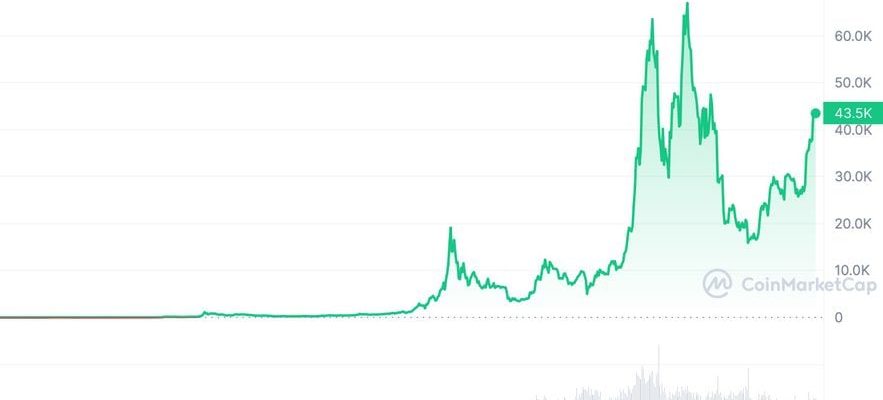It was easy to imagine bitcoin falling out of favor after the various affairs that shook the ecosystem of which it is the standard bearer. But neither the fall of Changpeng Zhao – the boss of Binance, the largest cryptocurrency exchange platform in the world – nor the even more resounding fall of Sam Bankman-Fried – at the head of the fallen rival FTX – will have put an end to land the most famous digital assets, launched in 2008 by the mysterious Satoshi Nakamoto. After falling to less than $16,000 per unit a year ago, its value is now close to $44,000. Its historic peak, around $69,000, dating from November 2021, now seems in the viewfinder.
The survival of bitcoin lies in a technical explanation, specialists like to point out. If it benefits from a trusting environment, it doesn’t need it to exist. As long as its blockchain works – the independent technological support on which it is based and which there is no reason to believe can be destroyed or corrupted – it will always be possible to carry out transactions. Since FTX or Binance are only facilitators, bitcoin can be weakened by their actions but never broken.
Its value then depends on a series of exogenous economic factors. Its instability, and the associated risks, is unattractive in a period of crisis, inflation or rising interest rates, more or less the last two years. Conversely, it can become an instrument of speculation when cash flows freely. Hence its growth between 2020 and 2021, in the era of Covid and “magic” money, as illustrated by the two peaks in the graph below.
The price of bitcoin since its creation
© / CoinMarketCap
Halving and ETFs
The current period does not match any of these criteria. The current surge in bitcoin is mainly based on the belief, in no way shaken, that this cryptocurrency will continue to rise. For a mechanical reason, first. As agreed in the initial terms of the cryptocurrency, a “halving”, planned for 2024, should halve the production of bitcoin. More rarity, therefore more value, and more wealth. The other explanation is historical. Even while swimming among the sharks in recent years, bitcoin ultimately never returned to its pre-Covid cold waters, below $10,000. Thus, only a small portion of investors who bet on this “digital gold” during its heyday, in 2020 and 2021, are losing for the moment. For the rest, the bets have often been winning.
Asset managers have understood: this longevity is an ally. One of the largest on the planet, BlackRock, is currently pushing for the creation of a dedicated stock market fund, a “spot” ETF, extremely simple to manage for investors, whether individual or institutional. This new financial instrument partly explains the current surge in bitcoin, which could be joined in the world of ETFs by Ether, or even other cryptocurrencies. Bitcoin, after all, represents “only” 50% of the cryptoasset market, increasing from $18 billion at the start of 2017 to $1,630 billion in capitalization today.
For The Economist, bitcoin, like other cryptocurrencies, nevertheless remains… a cockroach. A parasite with minimal impact on the global economy, cherished by terrorists and criminals who, unlike traders, love it for its obscure nature and the possibility it offers to free themselves from traditional banking intermediaries . In short, an asset that urgently needs to be regulated. Europe has already adopted a rather harsh text, in particular against stablecoins. The United States could also tighten the screws, as evidenced by the federal prosecutions against Binance and the opposition of the SEC, the stock market watchdog, to cryptocurrencies. One thing is certain: its use is growing, slowly but surely. Some 17% of Americans have already used, traded or invested in crypto in the United States, according to the Pew Research Center. Among young men, aged 18 to 29, this rate jumps to 41%.
Like the cockroach, continues the British weekly, this being which can “live without a head” and which nature has endowed with a “flexible exoskeleton which allows it to support up to 900 times its body weight”, bitcoin demonstrates of formidable robustness. These defenders cherish the hope that he will one day be able to honor his promises of freedom and financial inclusiveness, particularly with regard to those far from the current banking system. Become respectable, in short. Far from scandals.
.
